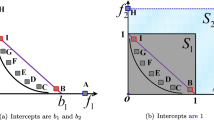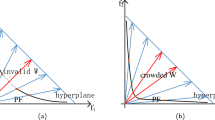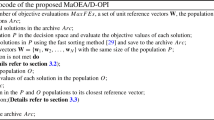Abstract
For many-objective optimization problems (MaOPs), how to get a set of solutions with good convergence and diversity is a difficult and challenging work. In this paper, a new decomposition-based evolutionary algorithm with adaptive weight adjustment is designed to obtain this goal. The proposed algorithm adopts the uniform design method to set the weight vectors which are uniformly distributed over the design space, and an adaptive weight adjustment is used to solve some MaOPs with complex Pareto optimal front (PF) (i.e., PF with a sharp peak of low tail or discontinuous PF). A selection strategy is used to help solutions to converge to the Pareto optimal solutions. Comparing with some efficient state-of-the-art algorithms, e.g., NSGAII-CE, MOEA/D and HypE, on some benchmark functions, the proposed algorithm is able to find more accurate Pareto front with better diversity.



Similar content being viewed by others
References
Al Mpubayed N, Petrovski A, McCall J (2014) D2MOPSO: MOPSO based on decomposition and dominance with archiving using crowding distance in objective and solution spaces. Evol Comput 22(1):47–78
Asafuddoula M, Singh HK, Ray T (2017) An enhanced decomposition-based evolutionary algorithm with adaptive reference vectors. IEEE Trans Cybern 48(8):2321–2334
Bader J, Zitzler E (2011) HypE: an algorithm for fast hypervolume-based many-objective optimization. Evol Comput 19:45–76
Cai L, Qu S, Cheng G (2018a) Two-archive method for aggregation-based many-objective optimization. Inf Sci 422:305–317
Cai L, Qu S, Cheng G (2018b) Two-archive method for aggregation-based many-objective optimization. Inf Sci 422:305–317
Cheng R, Jin Y, Olhofer M, Sendhoff B (2016) A reference vector guided evolutionary algorithm for many-objective optimization. IEEE Trans Evol Comput 20(5):773–791
Dai C, Wang Y (2015) A new uniform evolutionary algorithm based on decomposition and CDAS for many-objective optimization. Knowl Based Syst 85:131–142
Deb K, Jain H (2014) An evolutionary many-objective optimization algorithm using reference-point-based nondominated sorting approach, part I: solving problems with box constraints. IEEE Trans Evol Comput 18(4):577–601
Deb K, Thiele L, Laumanns M, Zitzler E (2002) Scalable multi-objective optimization test problems. In: Congress on evolutionary computation (CEC 2002), pp 825–830
Elarbi M, Bechikh S, Gupta A, Said LB, Ong Y-S (2018) A new decomposition-based NSGA-II for many-objective optimization. IEEE Trans Syst Man Cybern Syst 48(7):1191–1210
Fang KT, Wang Y (1994) Number-theoretic method in statistics. Chapman and Hall, London
Farina M, Amato P (2004) A fuzzy definition of “optimality” for many-criteria optimization problems. IEEE Trans Syst Man Cybern Part A Syst Hum 34(3):315–326
Friedrich T, Horoba C, Neumann F (2009) Multiplicative approximations and the hypervolume indicator. In: Proceedings of the 2009 genetic and evolutionary computation conference, pp 571–578
Huband S, Hingston P, Barone L, While L (2006) A review of multiobjective test problems and a scalable test problem toolkit. IEEE Trans Evol Comput 10(5):477–506
Hughes EJ (2005) Evolutionary many-objective optimisation: many once or one many. In: IEEE congress on evolutionary computation (CEC’05), Edinburgh, UK, vol 1, pp 222–227
Jiang S, Yang S (2016) An improved multiobjective optimization evolutionary algorithm based on decomposition for complex Pareto fronts. IEEE Transa Cybern 46(2):421–437
Li H, Zhang QF (2009) Multiobjective optimization problems with complicated Pareto sets, MOEA/D and NSGA-II. IEEE Trans Evol Comput 13(2):284–302
Li K, Deb K, Zhang Q, Kwong S (2015) An evolutionary many-objective optimization algorithm based on dominance and decomposition. IEEE Trans Evol Comput 19(5):694–716
Ma Qi Y, Liu X, Jiao F, Sun L, Wu J (2014) MOEA/D with adaptive weight adjustment. Evol Comput 22(2):231–264
Purshouse RC, Fleming PJ (2007) On the evolutionary optimization of many conflicting objectives. IEEE Trans Volut Comput 11(6):770–784
Robert S, Torrie J, Dickey D (1997) Principles and procedures of statistics: a biometrical approach. McGraw-Hill, New York
Sato H, Aguirre HE, Tanaka K (2007) Controlling dominance area of solutions and its impact on the performance of mOEAs. In: Obayashi S, Poloni C, Hiroyasu T, Murata T (eds) EMO 2007. LNCS, vol 4403. Springer, Heidelberg, pp 5–20
Saxena DK, Duro JA, Tiwari A, Deb K, Zhang Q (2013) Objective reduction in many-objective optimization: linear and nonlinear algorithms. IEEE Trans Evol Comput 17(1):77–99
Tan KC, Yang J, Goh CK (2006) A distributed cooperative coevolutionary algorithm for multiobjective optimization. IEEE Trans Evol Comput 10(5):527–549
Tian Y, Cheng R, Zhang X, Jin Y (2017) PlateEMO: a MATLAB platform for evolutionary multi-objective optimization. IEEE Comput Intell Mag 12(4):73–87
Van Veldhuizen DA (1999) Multiobjective evolutionary algorithms: classifications, analyses, and new innovations. Air Force Institute of Technology, Wright Patterson AFB
Wagner T, Beume N, Naujoks B (2007) Pareto-, aggregation-, and indicator-based methods in many-objective optimization. Lecture notes in computer science 4403: evolutionary multi-criterion optimization—EMO 2007. Springer, Berlin, pp 742–756
Wang L, Zhang Q, Zhou A (2016) Constrained subproblems in a decomposition-based multiobjective evolutionary algorithm. IEEE Trans Evol Comput 20(3):475–480
Yuan Y, Hua X, Wang B, Zhang B, Yao X (2016) Balancing convergence and diversity in decomposition-based many-objective optimizers. IEEE Trans Evol Comput 20(2):180–198
Zhang Q, Li H (2007) MOEA/D: a multiobjective evolutionary algorithm based on decomposition. IEEE Trans Evol Comput 11(6):712–731
Zhang H, Zhang X, Gao X et al (2016) Self-organizing multiobjective optimization based on decomposition with neighborhood ensemble. Neurocomputing 173:1868–1884
Zhao SZ, Suganthan PN, Zhang QF (2012) Decomposition-based multiobjective evolutionary algorithm with an ensemble of neighborhood sizes. IEEE Trans Evol Comput 16(3):442–446
Zhou A, Zhang Q (2016) Are all the subproblems equally important? Resource allocation in decomposition-based multiobjective evolutionary algorithms. IEEE Trans Evol Comput 20(1):52–64
Zhu H, He Z, Jia Y (2016) A novel approach to multiple sequence alignment using multiobjective evolutionary algorithm based on decomposition. IEEE J Biomed Health Inform 20(2):717–727
Zitzler E, Deb K, Thiele L (2000) Comparison of multiobjective evolutionary algorithms: empirical results. Evol Comput 8(2):173–195
Acknowledgements
This work was supported by National Natural Science Foundations of China (Nos. 61502290, 61401263, 61672334 and 61673251), China Postdoctoral Science Foundation (No. 2015M582606), Fundamental Research Funds for the Central Universities (No. GK201603094 and No. GK201603002) and Natural Science Basic Research Plan in Shaanxi Province of China (Nos. 2016JQ6045 and 2015JQ6228).
Author information
Authors and Affiliations
Corresponding author
Ethics declarations
Conflict of interest
The authors have declared that no conflict of interest exists.
Additional information
Communicated by V. Loia.
Publisher's Note
Springer Nature remains neutral with regard to jurisdictional claims in published maps and institutional affiliations.
Rights and permissions
About this article
Cite this article
Dai, C., Lei, X. & He, X. A decomposition-based evolutionary algorithm with adaptive weight adjustment for many-objective problems. Soft Comput 24, 10597–10609 (2020). https://doi.org/10.1007/s00500-019-04565-4
Published:
Issue Date:
DOI: https://doi.org/10.1007/s00500-019-04565-4




